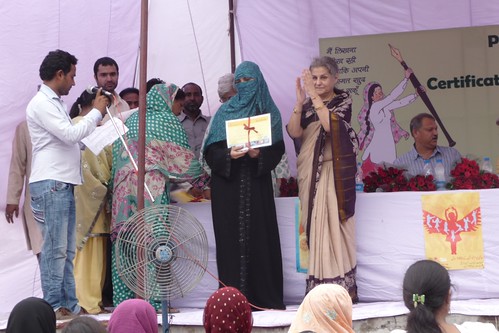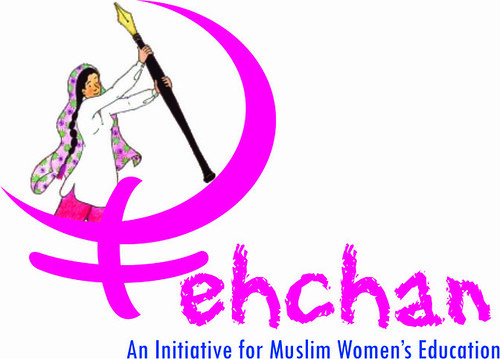By TCN Staff Reporter,
New Delhi: Imagine a situation where you visit an area where Muslim girls don’t have access to school and then you see them talking in English, on stage at a public function about their ambitions in life and the problems they face if they want to continue their studies. Well, you will be surprised and so was I, when a week ago I attended a certificate distribution function of Pehchan in Jaitpur, which is an “unauthorized colony,” in Delhi suburbs.
Because of its unauthorized status, Jaitpur which is predominantly populated by Muslims, doesn’t get its share of government schemes, and doesn’t have even a single government schools. In this situation, Pehchan is reaching out to Muslim girls and women of the area and is working for their empowerment through education and other skills.

Planning Commission member Syeda Hamid (first from R) awrding certificate to a student of Pehchan center in Jaitpur
Besides Jaitpur, Pehchan has been working in far flung villages of Mewat, Kashmir and Bihar. Pehchan has specifically focused on Mewat and runs several centers in the region which is one of the most backward Muslim dominated areas of this country.
Talking about the philosophy of an initiative like Pehchan, Shabnam Hashmi of Anhad says, “In spite of hundreds of schemes claiming to empower women, there are lakhs of Muslim women who have been left out and who live an invisible life. The gap unfortunately is filled by religious Muslim groups or Madarsas which impart some education but reinforce the age old values of keeping the women subjugated.”
“Literacy rate among Muslim women in backward areas like Mewat is under 25% and even less. Girls in the age group of 8-15 are totally illiterate. Most of them are married off by the time they turn 13 to 15,” says Hashmi who is also one of the patrons of Pehchan.
Pehchan has been established in order to fill this gap and reach out to Muslim women of these backward areas. Girls are enrolled for two years in the adult literacy and vocational training centers. First year is spent in imparting literacy and taking them up to the 5th standard and by the second year they will be taken up to the high school. During these two years they are also given vocational training and basic training in computers.
Pehchan is led by Farida Khan, an activist who has been engaged in the work of empowering women through education and other vocational training since more than a decade.
But running educational and vocational centers in a backward region like Mewat, is not an easy task. The communities are rigid and it requires deep engagement and counseling with the families and the community as a whole, to convince them to send their girls for adult literacy classes, says Farida.
Safety of their daughters and fear that the modern education will make them “uncontrollable” are the prime concerns of most of the traditional families which would otherwise prefer to keep their daughters at home instead of taking risk, adds Farida who has to spend lots of time in winning the confidence of families.

The symbolic logo of Pehchan showing a muslim girl using pen to assert her identity and empower herself through education
Pehchan also plans that its centers will work as resource centers for the whole village and community support groups will be developed around these centers as they have done in Mewat.
Pehchan plans to reach out to all the 503 villages over the next 5 years to:
• Create an environment where Muslim girls and women can be persuaded to acquire basic reading and writing skills and literacy.
• Inculcate in women the confidence that change is possible, if women work collectively.
• Spread the message that education of women is a pre-condition for the upliftment of the whole community.
• Run literacy classes and take women from basic literacy towards education along with vocational training.
• Form and consolidate villagers coordination committees to monitor development work
• Organising meetings, lectures on various topics; health, hygiene, child marriage, dowry, education, women literacy and empowerment, minority rights, constitutional rights given to minorities
• Organising regular interaction between the village monitoring committee and different state officials- District Collector, Chief Medical Officer, Block Development Officer etc
• Getting the government to provide basic infrastructure for the village through meeting, negotiations
• Sensitising and involving the urban youth to the reality and conditions of ordinary villagers in India.
Pehchan, which will officially be launched in September, requires help from various agencies and individual. It seeks individuals who could volunteer their time to work in villages and teach.
It also requires monetary support. But Hashmi points towards a typical trend among Muslims which doesn’t encourage monetary support towards non-religious activities.
“People will give you money for madarsas and mosques, but it’s very difficult to raise funds for education, health or any other philanthropic activities,” says Hashmi.
Talking about the fund requirement for Pehchan, Hashmi says, “We need to empanel at least 200 people in the first year who would commit to donate 15,000 per year.”
Pehchan can be contacted at [email protected]

